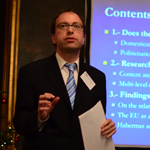Euroacademia Conferences
 Europe Inside-Out: Europe and Europeanness Exposed to Plural Observers (9th Edition) April 24 - 25, 2020
Europe Inside-Out: Europe and Europeanness Exposed to Plural Observers (9th Edition) April 24 - 25, 2020 Identities and Identifications: Politicized Uses of Collective Identities (9th Edition) June 12 - 13, 2020
Identities and Identifications: Politicized Uses of Collective Identities (9th Edition) June 12 - 13, 2020 8th Forum of Critical Studies: Asking Big Questions Again January 24 - 25, 2020
8th Forum of Critical Studies: Asking Big Questions Again January 24 - 25, 2020 Re-Inventing Eastern Europe (7th Edition) December 13 - 14, 2019
Re-Inventing Eastern Europe (7th Edition) December 13 - 14, 2019 The European Union and the Politicization of Europe (8th Edition) October 25 - 26, 2019
The European Union and the Politicization of Europe (8th Edition) October 25 - 26, 2019 Identities and Identifications: Politicized Uses of Collective Identities (8th Edition) June 28 - 29, 2019
Identities and Identifications: Politicized Uses of Collective Identities (8th Edition) June 28 - 29, 2019 The European Union and the Politicization of Europe (7th Edition) January 25 - 26, 2019
The European Union and the Politicization of Europe (7th Edition) January 25 - 26, 2019 7th Forum of Critical Studies: Asking Big Questions Again November 23 - 24, 2018
7th Forum of Critical Studies: Asking Big Questions Again November 23 - 24, 2018 Europe Inside-Out: Europe and Europeanness Exposed to Plural Observers (8th Edition) September 28 - 30, 2018
Europe Inside-Out: Europe and Europeanness Exposed to Plural Observers (8th Edition) September 28 - 30, 2018 Identities and Identifications: Politicized Uses of Collective Identities (7th Edition) June 14 - 15, 2018
Identities and Identifications: Politicized Uses of Collective Identities (7th Edition) June 14 - 15, 2018
Distant and Apolitical? A Comparative Study of the Domesticisation and Politicisation of the EU in Yorkshire (UK) and Galicia (Spain)
-
-

-
Presentation speakers
- Francisco Seoane Perez, Universidad de Castilla-La Mancha, Spain
- Juliet Lodge, University of Leeds, UK
- Download presentation
Abstract:
This paper draws on Carl Schmitt’s conceptions of democracy and ‘the political’ to explain the seemingly apolitical and distant character of the European Union. Schmitt conceived democracy as a regime of identity between the government and the governed, and ‘the political’ as ‘friend versus enemy’ relationship. When a political regime is domesticised, that is, when identification between representatives and represented exists, the ‘antagonistic’ politicisation between enemies would be replaced by the ‘agonistic’ politicisation between the members of a polity, that is, by an ideological, rather than inimical, left-versus-right contest. We test this intimate relationship between positive domesticisation and agonistic politicisation by interviewing the networks of EU-related political and social actors in two contrasting regions in Europe, Yorkshire in the UK (the paradigm of British euroscepticism) and Galicia in Spain (where the EU has been supported by most political elites), and by content-analysing the news that link the EU to these regions in their respective benchmark newspapers (The Yorkshire Post and La Voz de Galicia). In Yorkshire the predictions of the theory hold true (lack of identification leads to a friend-versus-enemy relationship), but in Galicia a positive domesticisation does not lead to an agonistic or left-versus-right politicisation. We suggest our findings can be explained by the following three elements: 1) The way the EU has been integrated (through a neofunctionalist avoidance of popular participation), 2) the way the EU is governed (diplomacy and corporatism are intrinsically against the publicity of procedures), and 3) the absence of a cohesive European identity that would allow for redistributive political decisions at a pan-European scale. The workings of the proverbial ‘communications gap’, by which the lack of political engagement with the EU would be attributed to the role of the news media, find little support in our study. A positive regard of the EU in Galicia by the political elites and the mainstream media has not made the EU popular there. Paradoxically, the EU is more ‘political’ in Yorkshire (in an antagonistic sense), with the EU embodying the enemy. -
Related Presentations

How Enlightened is the European Despotism? The Persistence of the Democratic Deficit in the European Union
- Emanuel Crudu
- Maria Eremenko

European Integration and Politicization of Europe Trough Ideational Entrepreneurs
- Xavier Carpentier Tanguy
















